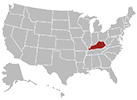
Working with animals may seem overwhelming to some people, even though they love animals.
A way to spend your day helping animals but not directly being responsible for their care is to become a vet office manager.
With this position, your input will be essential in making sure each animal patient receives the best care.
Yet, you won’t have the hands-on experience or need an in-depth understanding of animal anatomy.
Let’s take a look and see if this is the career you have been looking for.
Page Navigation
What Does a Vet Office Manager Do in Kentucky?
The vet office manager has a great many duties.
The exact ones will depend upon whether the office is small, with only a few employees, or large.
In most cases, the office manager:
- Hires and trains personnel
- Makes appointments
- Registers pet owners and files individual pet paperwork
- Prepares employee payroll
- Takes care of the billing of clients
- Schedules staff
- Manages inventory
This is just a small example of what all the office managers may be responsible for.
Many are also in charge of comforting pet parents when necessary and making sure the vet has everything they need to do their best job.
What Are the Licensing Requirements for a Vet Office Manager in Kentucky?
There are no actual licensing requirements to become a vet office manager in Kentucky, but the practice itself might require certain requirements to be met.
A good way to ensure you meet any employer requirements is to take the CVPM test, which requires that you have worked for at least three years as an office manager and earned at least 18 college credits.
You will also need four letters of recommendation.
You can learn more about this test and the certificate at https://practicequiz.com/cvpm-vet-manager-exam-prep.
A requirement that Kentucky does have is that anybody working in the vet office must pass a background check by the FBI and must be approved by the Kentucky Board of Veterinary Examiners.
Veterinary Office Manager Programs in Kentucky

Western Kentucky University
The 382 course hours spent on the program at Western Kentucky University will include such office topics as Word, Excel, and QuickBooks.
You will learn how to handle medical records, analyze accounts, and do basic bookkeeping.
You will also be instructed on the anatomy and physiology of small animals, learn techniques for taking vitals bathing small animals, and preparing prescriptions.
The total cost of this course is $3795.
![]()
Eastern Kentucky University
The course at Eastern Kentucky University is the same online course as that at Western Kentucky University.
The length is 382 hours, and the cost is $3795.
You will learn the basics of office management and will also study small animal behavior, taking patient histories, small animal nutrition, human-animal bonds, preparing invoices, managing inventory, communication, and organization.
Knowing how to talk with pet owners who are scared or confused is part of an office manager’s duties and understanding things like the human-animal bond will allow you to help ease fears and comfort those who need it.

Kentucky Wesleyan College
The program at Kentucky Wesleyan College is an extensive course that is designed to be finished in one year.
The total cost will be $3800 plus books.
Coursework includes a mixture of animal-related topics and office management topics.
Animal-related topics include small animal behavior and restraint, animal nutrition, the human-animal bond, small animal vaccines, infectious diseases, assisting with exotic species, and more.
Office-related topics include accounting basics, recording expenses and paying bills, taking patient histories, receptionist duties, managing inventory, and Microsoft Word and Excel.
Top 3 Schools in Kentucky
| School Name | Address |
|---|---|
| Western Kentucky University | 1906 College Heights Blvd, Bowling Green, KY 42101, USA |
| Eastern Kentucky University | 521 Lancaster Ave, Richmond, KY 40475, USA |
| Kentucky Wesleyan College | 3000 Frederica St, Owensboro, KY 42301, USA |
How Much Does a Vet Office Manager Make in Kentucky?
The amount of money you can make as a vet office manager will vary depending on your experience, whether the practice is in a small or large area and the size of the practice.
On average, a vet office manager in Kentucky can expect to earn $71,849 a year.
This translates into approximately $34.54 per hour.
Annual Salary Range:Average Salary of Vet Office Managers in Kentucky
| City Name | Salary |
|---|---|
| Bowling Green | $77,653 |
| Owensboro | $80,307 |
| Covington | $82,909 |
| Richmond | $78,276 |
| Hopkinsville | $76,791 |
| Lexington | $78,984 |
| Louisville | $81,595 |
| Frankfort | $78,003 |
| Albany | $77,687 |
| Bremen | $76,894 |
Regional Salary in Kentucky
| Region | Employed | Avg. Annual Salary | Avg. Hourly Pay | Top 10% Annual Salary | Bottom 10% Annual Salary |
|---|---|---|---|---|---|
| Bowling Green, KY | 80 | $115,020 | $55.30 | $164,990 | $55,870 |
| Elizabethtown, KY | 40 | $96,330 | $46.31 | $167,600 | $46,260 |
| Lexington-Fayette, KY | 280 | $108,860 | $52.34 | $184,200 | $55,670 |
| Louisville/Jefferson County, KY-IN | 950 | $112,300 | $53.99 | $179,330 | $54,970 |
| Owensboro, KY | 40 | $99,620 | $47.89 | $142,760 | $49,660 |
| Paducah, KY-IL | 50 | $106,570 | $51.24 | $157,680 | $52,090 |
* Employment conditions in your area may vary.
Frequently Asked Questions
How much money does a vet office manager make in Kentucky?
On average, the typical vet office manager in Kentucky earns about $34.54 an hour.
As is normal, this will depend a lot on where you find a position and what all your duties encompass.
What traits do I need to become a good vet office manager in Kentucky?
In addition to the office skills required to be a good vet office manager, a person who thrives in this position must love animals, be organized, be empathetic, be patient, and be able to deal calmly with any crisis that may occur.
It also helps if you are a good communicator.
Does a vet office manager need to be certified in Kentucky?
No, certification is not required, but you will need to pass an FBI background check.
Individual employers may also add other requirements such as certificates or degrees, or at least some training specific to animal-related care.




